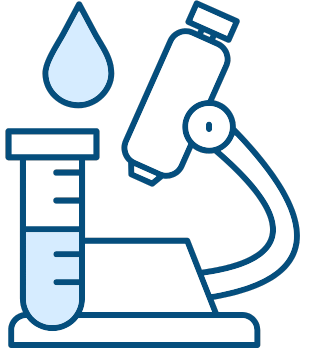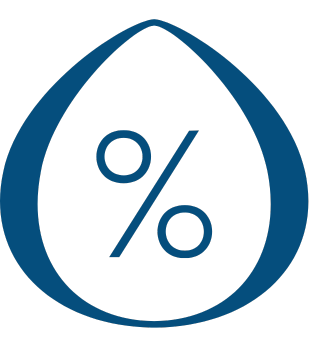Electrolyte restoration
Electrolytes are essential minerals that are vital for maintaining the body’s fluid balance. They help transport water into cells and regulate muscle and nerve function. Electrolytes are important not only for general health but also for the effective treatment of hangovers.
Lost through sweat, defecation and vomiting, electrolytes such as sodium, potassium, calcium and magnesium are essential for the body’s rapid recovery and for relieving hangover symptoms. Restoring the levels of these important minerals not only helps to restore hydration more quickly, but also ensures that the nervous system functions perfectly. So taking electrolytes not only helps to restore body fluids, but also provides strength and improves general wellbeing after drinking alcohol.
Electrolyte drips
The most effective treatment for hangovers is electrolyte drip (intravenous therapy), as the therapeutic components are released directly into the bloodstream, ensuring that all components are 100% bioavailable.
Electrolyte restoration and recovery from alcohol can be even more effective with a customised Hangover drip. This intravenous therapy differs from conventional supplements as it ensures rapid and effective absorption of the active ingredients thanks to individually adjusted doses.
The Hangover drip consists of ringer’s, sodium chloride solutions, vitamin C, magnesium sulphate, glucose and potassium electrolytes. These ingredients help to restore the body’s fluid balance more quickly, replenish electrolyte reserves and provide essential nutrients to improve general well-being and reduce hangover symptoms. Additional medications tailored to individual needs can also be added for a more effective recovery.
Electrolyte supplements
Electrolytes can be used in a variety of forms, from electrolyte gels and tablets to powders and drinks. Popular choices include powders, available in pharmacies for oral solution, which help restore essential body substances such as glucose, sodium chloride, sodium citrate and potassium chloride.
Although powder is a convenient and quick way to restore electrolyte levels after alcohol consumption, an intravenous drip is a much more effective treatment for hangovers, due to better absorption of the substances, as well as individual tailoring.
Why do we have hangovers?
A hangover is associated with a wide range of symptoms that are caused by the following main reasons:
- Dehydration. Alcohol is a diuretic, i.e. it promotes urination. This makes it easier to lose fluid both during and after alcohol consumption. Dehydration is one of the main causes of headaches, dizziness and, of course, thirst.
- Gastrointestinal disorders. Alcohol irritates and increases acid production in the digestive system. Depending on the amount of alcohol consumed, it can speed up or slow down the movement of food masses through the digestive tract. This effect is associated with nausea, vomiting and diarrhoea.
- Electrolyte imbalance. Alcohol consumption affects the electrolyte levels in the body. Electrolyte imbalance can cause headaches, irritability and weakness.
- Weakening of the immune system. Many of the symptoms of a hangover, including nausea, lack of appetite and lack of concentration, may be related to temporary changes in the immune system.
- Low blood sugar. Alcohol consumption limits the body’s production of sugar (glucose). Low blood sugar is associated with fatigue, dizziness and irritability.
- Sleep disturbance. Although excessive alcohol consumption can cause drowsiness, it also interferes with quality sleep. As a result, you may feel more tired than usual the next day
These symptoms are individual to each person and their mood at the time, and sometimes they can be very mild and other times they can completely disrupt your day.
Effects of alcohol on the liver
Frequent alcohol consumption causes serious damage to the human body, especially to the liver, one of our main internal organs. The liver performs vital functions:
- filters toxins from the blood,
- helps digest food,
- regulates blood sugar and cholesterol levels
- helps fight infections and diseases.
Despite the fact that the liver is extremely resilient and has the ability to regenerate, alcohol has a profound effect on this organ. Each process of alcohol filtration in the liver leads to the death of certain liver cells. Although the liver is capable of developing new cells, prolonged and intensive alcohol consumption can severely reduce their regeneration, causing serious and often irreversible damage to the organ.
Alcohol-induced liver diseases such as cirrhosis, steatohepatitis, fibrosis and alcoholic hepatitis cause liver damage including fat accumulation, inflammation and scarring. If these diseases are diagnosed early, before they cause severe damage, they can be treated. Without cirrhosis, in which severe damage occurs, the liver cannot recover or regain its normal function. Continued excessive alcohol consumption can significantly shorten life expectancy.
Ways to restore the liver
After prolonged alcohol consumption, rebuilding the body is an important step in maintaining health and well-being. If you feel that your liver has been severely stressed, there are a number of effective ways you can help it recover. The following are tools and recommendations for recovering from prolonged alcohol consumption.
- Moderate alcohol consumption
To reduce the effects of alcohol on the liver, try to drink less or no alcohol at all. The average safe consumption of alcohol is up to two standard drinks per day for adult men and up to one drink per day for women. The recommended amount for men and women differs because men have a higher concentration of dehydrogenase (the enzyme that breaks down alcohol). The quantity of a standard drink depends on the type of drink:
The “standard drink” varies depending on the type of alcohol, for example:
- 350 ml of beer (5% alcohol)
- 250 ml of malt alcohol (7% alcohol)
- 150 ml of wine (12 % alcohol)
- 45 ml of spirits (40 % alcohol)
The initial alcohol-induced liver disease, known as fatty hepatitis, can be reversed by abstaining from alcohol for 4-6 weeks. However, some people with this disease may need a longer period of abstinence or even complete withdrawal from alcohol.
Long-term alcohol abuse can lead to permanent liver damage and even cirrhosis. Unfortunately, the damage caused by cirrhosis cannot be reversed, so it is important to pay attention to your drinking habits and change them if necessary.
- Avoid substances harmful to the liver
The active ingredient is a safe pharmacy remedy for the relief of mild pain, fever or headache. However, in high doses it can cause liver damage. It can also aggravate existing liver problems. Other toxins such as cleaning products, paint fumes and paint thinners can also damage this organ.
- Healthy eating
As with many health conditions, liver function can be improved after moderate alcohol consumption by following a healthy diet. Obesity, like alcoholism, is one of the main causes of liver disease. Therefore, in addition to giving up alcohol, it is essential to take care of one’s diet to ensure good liver function.
It is important to avoid processed foods and high-sugar products, as these can trigger inflammatory processes in the body and increase the load on the liver. Instead, it is recommended to choose a diet rich in fresh fruit and vegetables, as well as protein from lean meat and fish. Vegetable proteins from beans, lentils and other legumes are also an excellent choice.
In addition, it is essential to include healthy fats such as olive oil, nuts and seeds, which help reduce inflammation and improve liver health. Regular moderate physical activity and sufficient water intake are also important for liver health, helping to flush toxins from the body.
- Supplements and vitamins to restore liver function
After heavy alcohol consumption, the liver requires special care, in which various vitamins and minerals play an important role. Vitamin C protects the liver from oxidative damage and helps to remove toxins, while Vitamin E protects cells and promotes their regeneration. B vitamins support energy processes and Vitamin D reduces inflammation.
Vitamin K, magnesium and selenium are essential for liver function and toxin removal, while zinc improves tissue repair. Omega-3 fatty acids and rosehip seed (silymarin) provide additional anti-inflammatory effects, thus protecting the liver. The combination of these nutrients not only provides the essential components for a healthy liver, but also acts as medicines to repair the liver, promoting its regeneration after damage..
Summary
The main strategy for treating hangovers is to restore electrolytes. Vital minerals such as sodium, potassium, calcium and magnesium are essential for maintaining the body’s fluid balance, especially after heavy alcohol consumption. Electrolyte replenishment can be carried out in a variety of forms, from intravenous drips to gels, tablets, powders or drinks. Intravenous therapy is particularly effective as it allows immediate and precise delivery of therapeutic substances into the bloodstream, ensuring a rapid recovery.




